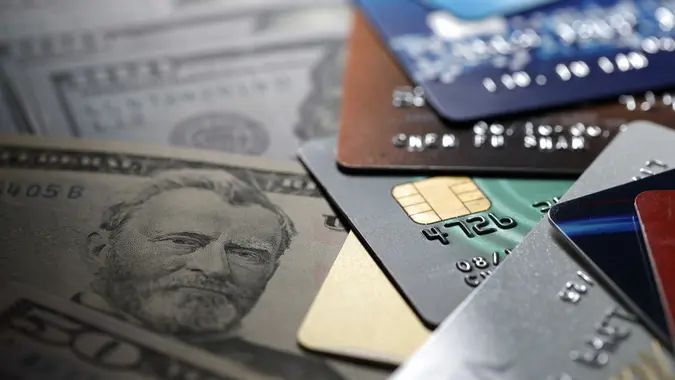5 Reasons Balance Transfer Cards Are Your 2025 Debt Solution

Commitment to Our Readers
GOBankingRates' editorial team is committed to bringing you unbiased reviews and information. We use data-driven methodologies to evaluate financial products and services - our reviews and ratings are not influenced by advertisers. You can read more about our editorial guidelines and our products and services review methodology.

20 Years
Helping You Live Richer

Reviewed
by Experts

Trusted by
Millions of Readers
Carrying a credit card balance from month to month usually means getting hit with steep interest charges. The average credit card interest is more than 22%, making it even more expensive to carry credit card debt.
A balance transfer card can help you tackle debt without accruing the high interest. These cards let you move your existing credit card balance to a new card that offers a 0% introductory annual percentage rate (APR) for a set period of time, usually 12 to 24 months.
Here are five reasons you may want to consider a credit card balance transfer to tackle debt faster.
Save Money on Interest While Paying Down Debt
One of the major advantages of balance transfer cards is the 0% introductory APR. This means every amount you pay goes toward reducing your principal, not covering interest charges.
For example, if you carry $7,000 in credit card debt at 22% APR, you’d pay nearly $1,540 a year in interest alone. With a balance transfer card offering 0% APR for 12 months, you could save all that money or channel it toward reducing the balance.
The longer the introductory period, the more you’ll save on interest. Many cards offer introductory periods of 12 months, but some are as long as 18 to 24 months. So, it’s worth shopping around.
Consolidate Your Payments
Managing multiple credit card payments with varying due dates, minimum amounts and interest rates can be overwhelming and often leads to missed payments. A balance transfer card can help you consolidate all your credit card debts into one card, where you’ll make one monthly payment.
This consolidation makes it easier to stay organized, track progress and reduce the risk of missed payments. And if you’re focused on a single balance, you’re more likely to stay motivated and stick to your payoff plan.
Lower Monthly Payments
Another reason balance transfer cards can be an excellent debt solution is that they can reduce your monthly payments. With the 0% APR, your minimum payments will be lower than when interest is charged.
While lower monthly payments can provide some breathing room, it doesn’t mean you slow down your payoff progress. The smartest move is to pay the same amount you were to pay before or even more so you pay down the balance before the promotional period ends.
Your Credit Score May Improve
A balance transfer card can improve your credit utilization ratio, the percentage of available credit you’re using. If you’re currently maxed out on multiple cards, transferring balances to a new card with fresh credit limits can significantly reduce your overall utilization, which can improve your credit score.
Some Cards Offer Rewards or Perks
While the biggest benefit of balance transfer cards is the interest-free period, some come with additional perks. Depending on the card, you might earn cash back, points, or travel rewards on new purchases once your balance is under control. Others may include perks like purchase protection or extended warranties.
Things To Watch Out for
Balance transfer cards can help tackle credit card debt faster, but they’re not without caveats. Here are a few things you need to know before applying:
- Balance transfer fees: Most cards charge 3% to 5% of the transferred balance.
- The intro APR is temporary: The introductory APR lasts only for the limited promotional period, before the regular APR kicks in.
- Credit score requirements: You need a good credit score to qualify for a balance transfer card with the best terms.
- New debt temptation: The interest-free period can be tempting to spend more. But adding new purchases instead of focusing on paying down your balance could lead to more debt.
 Written by
Written by  Edited by
Edited by 

























